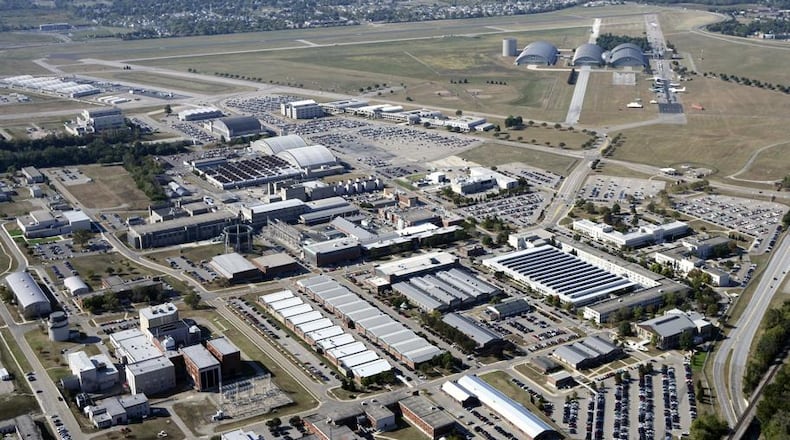“With Space Force, we do face some risk at our base,” Turner said. “That is of course that we currently are the site for space intelligence. NASIC and other offices and agencies at Wright-Patterson Air Force Base provide a significant amount of the analysis and the assimilation of all source data to be able to understand what our adversaries are doing in space.”
Lt. Gen. David Thompson, vice commander of Space Force, the sixth U.S. military branch, indicated in his own remarks that some change is possible, saying Space Command leaders are still determining whether they will have a separate intelligence center or new functions created to meet force needs.
RELATED: New Space Force will depend on Wright-Patt missions
“We are still trying to determine whether that means a separate and distinct national space intelligence center or some other arrangement or relationship with NASIC as it is today or other parts of the intelligence community,” Thompson said.
Credit: Wayne A. Clark
Credit: Wayne A. Clark
He added: “What I can say for sure is there’s a tremendous foundation of knowledge and expertise in NASIC today, of the infrastructure, the systems, the data, all of that that NASIC has built are a tremendous national asset in space, and I have no question and no doubt that Wright-Patterson Air Force Base — the individuals and infrastructure and people today in NASIC at Wright-Patt — will be a key part of any future space intelligence.”
This is a concern Turner has expressed for some time. He has spoken with Defense Secretary Mark Esper and other Pentagon leaders about the possibility that some NASIC functions could be somehow diluted or pulled from Wright-Patterson to a new Space Command location.
RELATED: Springfield Air Guard wing aims for Space Force mission
Thus far, they have all made a “strong commitment to make sure” space intelligence functions remain anchored at Wright-Patterson, Turner said.
“This gives us a great opportunity for us to ensure that we solidify our role in intelligence,” the Dayton Republican said.
“There is absolutely no question that we need to grow and improve the intelligence enterprise associated with the space domain and the Space Force,” Thompson said. “NASIC today and for years has provided tremendous foundational intelligence about space systems, what they are, what their capabilities are.”
He added: “We need to add layers of what I’m going to call operational and tactical intelligence on top of that — what tactics do our adversaries use, how effective are their weapons, what tactics might be deployed.”
RELATED: Defense secretary: No need to duplicate NASIC through Space Force
But the three-star general also stressed the “vital role” Wright-Patterson has played in the growth of the nation’s aviation power, and he expressed confidence in the base’s future.
“We can envision probably only a growing role for Wright-Patt,” Thompson said when asked a possible base role in Space Force.
Thompson said the Pentagon is looking for an area that provides a strong quality of life, is located close to a military base, in “livable cities and livable metropolitan areas,” with a population and highly skilled workforce available for Space Command jobs.
“A relatively large and sophisticated metropolitan area, not necessarily huge,” Thompson said.
“It would certainly not be a surprise to find that Dayton would meet all that criteria and would be a great candidate,” Thompson said.
“We do meet all the requirements for the Space Command headquarters,” said Jeff Hoagland, the coalition’s president and chief executive.
The latest Defense Authorization Act includes the full $182 million of funding for the long-planned NASIC headquarters expansion, which is Wright-Patterson’s largest construction project in its history, Turner said.
“When I was first elected there were 19,000 people inside that (Wright-Patterson) fence. And now we have 30” thousand, Turner said.
“We might not get the (Space Command) headquarters in our region, but we should definitely get … some ancillary missions,” said U.S. Rep. Warren Davidson, R-Troy.
Turner has called Ohio Gov. Mike DeWine directly to ask him to help the state “speak with one voice” supporting one application from the state of Ohio for Space Command headquarters, and on Tuesday, DeWine endorsed Dayton’s bid.
“We could have easily had another major metropolitan area stepping forward,” Turner said.
For 35 years, coalition leaders and community allies have flown to Washington, D.C. to speak with political leaders about Dayton’s needs and priorities.
About the Author


